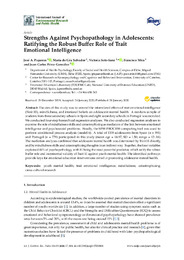Please use this identifier to cite or link to this item:
https://hdl.handle.net/11000/34562Full metadata record
| DC Field | Value | Language |
|---|---|---|
| dc.contributor.author | Piqueras, Jose A | - |
| dc.contributor.author | Salvador, Maria do Céu | - |
| dc.contributor.author | Soto-Sanz, Victoria | - |
| dc.contributor.author | Mira, Francisco | - |
| dc.contributor.author | Pérez González , Juan Carlos | - |
| dc.contributor.other | Departamentos de la UMH::Psicología de la Salud | es_ES |
| dc.date.accessioned | 2025-01-15T20:09:45Z | - |
| dc.date.available | 2025-01-15T20:09:45Z | - |
| dc.date.created | 2020-01 | - |
| dc.identifier.citation | Int. J. Environ. Res. Public Health 2020, 17, 804 | es_ES |
| dc.identifier.issn | 1660-4601 | - |
| dc.identifier.issn | 1661-7827 | - |
| dc.identifier.uri | https://hdl.handle.net/11000/34562 | - |
| dc.description.abstract | The aim of this study was to unravel the interrelated effects of trait emotional intelligence (Trait EI), mindfulness, and irrational beliefs on adolescent mental health. A random sample of students from three secondary schools in Spain and eight secondary schools in Portugal was recruited. Weconducted four-step hierarchical regression analyses. We also conducted regression analyses to examine the role of mindfulness skills and catastrophizing as mediators of the link between emotional intelligence and psychosocial problems. Finally, the SPSS PROCESS computing tool was used to perform conditional process analysis (model 6). A total of 1370 adolescents from Spain (n = 591) and Portugal (n = 779) participated in this study (mean age = 14.97, SD = 1.50; range = 12–18). The mediation analyses confirmed that adolescent mental health was determined by Trait EI directly, andbymindfulnessskillsandcatastrophizingthoughtsinanindirectway. Together, thefourvariables explained 44% of psychopathology, with EI being the most powerful predictor, which ratify the robust buffer role and incremental validity of Trait EI against youth mental health. The identified pathways provide keys for emotional education interventions aimed at promoting adolescent mental health | es_ES |
| dc.format | application/pdf | es_ES |
| dc.format.extent | 13 | es_ES |
| dc.language.iso | eng | es_ES |
| dc.publisher | MDPI | es_ES |
| dc.rights | info:eu-repo/semantics/openAccess | es_ES |
| dc.rights | Attribution-NonCommercial-NoDerivatives 4.0 Internacional | * |
| dc.rights.uri | http://creativecommons.org/licenses/by-nc-nd/4.0/ | * |
| dc.subject | youth mental health | es_ES |
| dc.subject | trait emotional intelligence | es_ES |
| dc.subject | mindfulness | es_ES |
| dc.subject | catastrophizing | es_ES |
| dc.subject | cross-cultural research | es_ES |
| dc.subject.other | CDU::1 - Filosofía y psicología | es_ES |
| dc.title | Strengths Against Psychopathology in Adolescents: Ratifying the Robust Buffer Role of Trait Emotional Intelligence | es_ES |
| dc.type | info:eu-repo/semantics/article | es_ES |
| dc.relation.publisherversion | https://doi.org/10.3390/ijerph17030804 | es_ES |

View/Open:
Piqueras et al., 2020 (1) (1).pdf
814,97 kB
Adobe PDF
Share:
.png)
